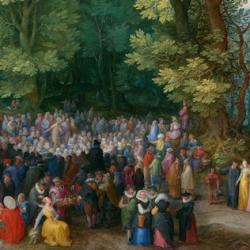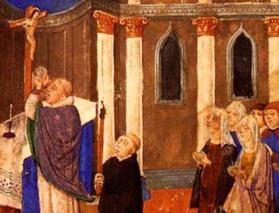What does God give in creation and redemption? He gives us our own existence, and that the gift He gives is Himself. Both are true.
Luther captures this latter point in his 1528 “Confession”: “These are the three Persons and the one God, Who has given Himself to us wholly with all that He is and all that He has. The Father gives Himself to us, with heaven and earth and all created things, that they may be profitable and of service to us. But this gift was obscured and made fruitless by Adam’s fall, and the Son also gave Himself to us, bestowed on us all His works, sufferings, wisdom and righteousness, and reconciled us to the Father, so that, once more alive and righteous, we perceive and possess the Father and His gifts. But such grace would profit no one if it were to remain a hidden secret and could not be imparted to us. So the Holy Ghost also comes and gives Himself completely to us, teaches us the bounty of Christ, makes us perceive and understand it, helps us to receive and keep it, to use it profitably, to administer it and to increase and further its spread among men, and this He does both inwardly and outwardly. Inwardly through faith and other spiritual gifts but outwardly through the Gospel, through Baptism and the Sacrament of the Altar, through which, as through means or instruments He comes to us, applies the sufferings of Christ to us and makes them profitable to salvation.”
Augustine grasped this too, arguing that the gift of the Spirit is a gift in Book 15 of the de Trinitate. Because the Spirit is love, the Spirit given to us implants love in us, and “nothing is more excellent than this gift of God.” It is the sole gift that “distinguishes between the sons of the eternal kingdom and the sons of perdition.” The Spirit, to be sure, gives other gifts, but “without charity they are of no use.” Augustine raises again the question of why the Spirit specifically is “gift”: “Only because of the love without which the man who has not got it, though he speak with the tongues of men and of angels, is booming bronze and a clashing cymbal; and if he has no prophecy and knows all mysteries and all knowledge and has all faith and if he gives over his body to burn, it does him no good. What a great good must it be the, without which such great goods cannot bring anyone to eternal life! . . . So the love which is from God and is God is distinctively the Holy Spirit; though him the charity of God is poured out in our hearts, and through it the whole triad dwells in us. This is the reason why it is most apposite that the Holy Spirit, which being God, should also be called the gift of God. And this gift, surely, is distinctively understood as being the charity which brings us through to God, without which no other gift of God at all can bring us through to God.”
That God gives Himself is not the speculation of theologians but the heart of the gospel. What God gives to us in the gospel is fellowship with Him, communion with Him, eternal life with Him. In the most famous verse in the New Testament, Jesus says that the Father loved the world and “gave” His only-begotten Son (John 3:16). This gift from the Father is also a self-gift of the Son, who “gave Himself for our sins” to rescue us from the present evil age (Galatians 1:4; cf. 1 Timothy 2:6; Titus 2:14), “gave Himself for me” (Galatians 2:20), and, as a loving husband, “gave Himself” for His bride (Ephesians 5:2, 25). Not only the Son, but the Spirit, as Augustine recognized, is a gift from the Father and the Son to us (2 Corinthians 1:22; 5:5), so that all who believe and are baptized receive the gift of the Spirit (Acts 2:38), whether Jews or Gentiles (Acts 10:45). And when the Son and Spirit are given, the Father is given as well. Through the Spirit, Father, Son and Spirit come to be with us. We are ingrafted into them, and they in us.
Two biblical themes support and fill out this picture. First, one of the basic promises of the covenant from the time of Abraham is that the Lord would be with His people, the promise of Immanuel, God identifying with us and dwelling with us. This is fulfilled in part when God tabernacles among Israel in the wilderness, and again more fully and fixedly when God dwells in the temple in Jerusalem. But the supreme fulfillment of this promise comes with the incarnation, when the Son comes to dwell not in a tent or a temple but in human flesh, in Jesus who is the tabernacle and temple of God, where the Lord displays His glory. And through this dwelling in human flesh, the Son also comes to dwell in His Spirit in our flesh, in the human flesh of the church. Through the Spirit, we are made the tabernacle and temple of God, God’s dwelling in flesh. And through the Spirit God gives Himself to us.
The other, related theme is that of marriage, one of the Bible’s main images of the covenant relation. God comes to dwell in us, and enters into our tent of flesh, in the way a husband comes to dwell in the temple of his wife. The Lord joins Himself to us as a husband to a bride. Jesus is the greater Adam, the true husband, who “gave Himself” for His bride, who nourishes and cherishes His bride as His own flesh with His own flesh. In short, the marriage imagery of Scripture, with the related covenant reality, makes it clear that the chief gift that God gives His people is the gift of Himself, His own presence, His own fellowship, His own life.
How does God give Himself? And how can we know how God gives Himself? God gave Himself to us 2000 years ago on the cross, but how can we receive Jesus today? Where do we go to get this gift, the gift of life and fellowship, God’s gift of God to us?
God gives Himself in Word and Sacrament.
We can think analogically. How does a lover give himself to his beloved? How does a husband give himself to his wife? Clearly, he does this by action, by doing good for his wife, by protecting and providing for her, by giving his life for her. There is also a verbal dimension to a lover’s self-gift. When two people marry, they promise to be exclusively for one another until death parts them. They give themselves by promising to be faithful, by declaring their love for one another. Even before the wedding, a lover gives himself to his beloved in word. He declares His love, promises to love her forever, and so on. Without this verbal exchange, there is no mutual love, no relationship of love, no mutual self-giving.
The Divine Lover gives Himself not only in Word but also in Sign and Sacrament. Sacraments are not human works. Baptism is not a human work, a profession of faith and commitment to God. Baptism is a work of God, God’s declaration concerning the person baptized not the person’s declaration concerning God. Nor is the Supper a human work, a performance before the Lord that will win His favor. Baptism and the Supper are both God’s works, God’s enacted word.
This implies something about our definition of sacraments in general. There have been many such general definitions in the history of the church, and most of them are fine as they go, but need to be understood clearly. For many modern Christians, to say a sacrament is a sign, for instance, is to say it is “merely a sign” and not a “reality.” The sacrament doesn’t do or given anything at all; it merely is a picture of what God is doing otherwise than through the sacrament. Baptism is a picture of someone being cleansed but not cleansing; the Supper is a portrait of an absent Christ not a sign of the present Christ.
Recognizing that sacraments are gifts gets us past this minimalist sacramental theology. Gifts are not “mere signs.” They signify, but they also confer. When a lover gives his beloved a vase of flowers or a box of chocolates, he is not merely giving plant life or fattening food. Nor is he merely signifying his love. He is giving something of himself. The gift is a sign of a self-gift; but not only a sign, because the various gifts we give our beloved are also the “means” of our self-gift. If we gave nothing to our beloved – no words of love, no physical gifts, no gifts of help and encouragement, no gift of time – then we’d rightly be accused of being very bad lovers. We can’t say that we give ourselves when we give nothing else at all. We give ourselves, let us say, “in, with, and under” the gifts that we give.
And so does God: In baptism, He gives Himself to the baptized through the gift of baptism; in the Supper, He gives Himself to us in the gifts of bread and wine.











